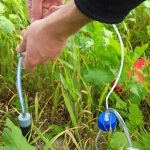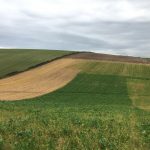Research on crops to protect South Downs water
August 6, 2018
Research funded through the Brighton ChaMP partnership shows that farmers who plant different crops can help reduce nitrogen pollution in South Downs National Park water.
The South Downs’ rivers and aquifers are an integral part of the South Downs landscapes, relied on by 1.2 million people as well as the wildlife that lives here. But our water is in trouble – like many aquifers and rivers across the world, it is polluted with nitrates from fertilisers, manure heaps and stock yards as well as pollution from road run-off.
Brighton ChaMP (Chalk Management Partnership) for Water is a collection of organisations, led by the South Downs National Park Authority, taking action to protect our groundwater – water which has fallen as rain and is held in the chalk rock beneath our feet.
The Environment Agency, Natural England, Southern Water, Brighton & Hove City Council and University of Brighton ChaMP project partners have spent the past year researching whether using cover crops can reduce nitrates from fertilisers getting into our ground water.
Winter is a particularly vulnerable time as bare fields and higher rainfall allow the nitrates in the soil to leach through into the aquifer – this can be detected as nitrate spikes at the boreholes which supply our fresh drinking water.

Over the past year the team have worked with two farmers in the Brighton area who planted different varieties of crops and left a bare fallow control plot. They then collected water samples from the soil from each area of crop and fallow ground. The results of the research, carried out by Mark Eastes at the University of Brighton, are encouraging.
“We found that all types of cover crop significantly reduced nitrates leaching into groundwater compared to leaving it fallow over winter,” says Simon Deacon from the Environment Agency. “The amount of reduction varied from between 40 and 70 % and this depended both on the crop but also on the crop’s location. Which suggests that other factors also play a role. It looks like the best results will come from individual farms using tailored ‘recipes’ for their cover crops.”

There is clearly more work to be done in the area and future challenges for the ChaMP partners will include how to support and encourage more farmers to apply these results on their own land. Other issues might come to light in the longer term but concerns that the introduction of cover crops might increase pests, resulting in the need for more pesticides, were unfounded. There were no more snails and slugs on the cover crops than in the control fallow areas.
The good news is that it is possible to improve water quality through sustainable land and water management, using catchment and aquifer based approaches.
About the ChaMP Water partnership
Established in 2016, the ChaMP partnership is made up of the South Downs National Park Authority, the Environment Agency, Southern Water, Brighton & Hove City Council and the University of Brighton, working together with the Brighton & Lewes Downs UNESCO Biosphere (The Living Coast) and Natural England.
Partners are working together to protect groundwater quality with both urban and rural programmes: promoting sustainable drainage systems to better manage polluted surface water running off the roads as well as rural programmes with farmers and landowners.
www.southdowns.gov.uk/care-for/water/brighton-champ-for-water/
